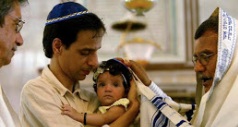MAGEN ABOTH SYNAGOGUE (1897; demolished)
(originally known as Beth Ha Knesset)
Blackburne Lane
Kolkata (formerly Calcutta)
West Bengal, INDIA
The building, a medium-size structure in central Kolkata, was torn down a few decades back, so it is no longer available to visit it.
Magen Aboth Synagogue, once known as Beth Ha Knesset and dating to 1897, was one of the synagogues constructed in Kolkata to serve the sizeable community of Baghdadi Jews. These community members had come mostly from Iraq, but some also originated in Iran and from places within the Ottoman Empire. The earliest Baghdadi Jews had arrived on a seasonally or temporary basis in the late eighteenth century, often based in the western Indian port city of Surat. In time, a permanent enclave was formed in Kolkata with others in Mumbai, Pune, and Yangon, Myanmar. The Baghdadi Jews were seeking religious tolerance and the opportunity to succeed in their work and daily lives. The community as a whole became comparatively well-educated and economically comfortable in their adopted cities in India and Myanmar. Kolkata offered the Baghdadis affiliated with this synagogue the chance to become fully practicing Jews and productive citizens of the broader local community.
Magen Aboth, Neveh Shalome, Magen David, Beth El, and Shaare Rason (a small prayer space dating to 1933 on an middle floor of a mid-rise mostly residential building, now closed) together accommodated the Baghdadi Jewish community. When Magen Aboth closed some decades ago, the building was sold, and in time the structure was demolished. In recent years, only a partial wall of the synagogue remained standing.
As a result of political and social changes in India that started in the 1950s, India’s Baghdadi Jewish population decreased precipitously. With this change came the decline of synagogue life in Kolkata. In recent decades, Neveh Shalome along with Magen David and Beth El synagogues have remained open, although these congregations are very small and regular prayer services are no longer held at these sites. Today the Baghdadi Jewish population of Kolkata was estimated to number only around twenty people. Kolkata’s extant synagogue buildings continue to be lovingly watched over by dedicated Muslim caretakers who, like the Baghdadi Jews left here, recognize the building as an important religious and civic monument that has been a part of the history and fabric of the Kolkata for many years.








